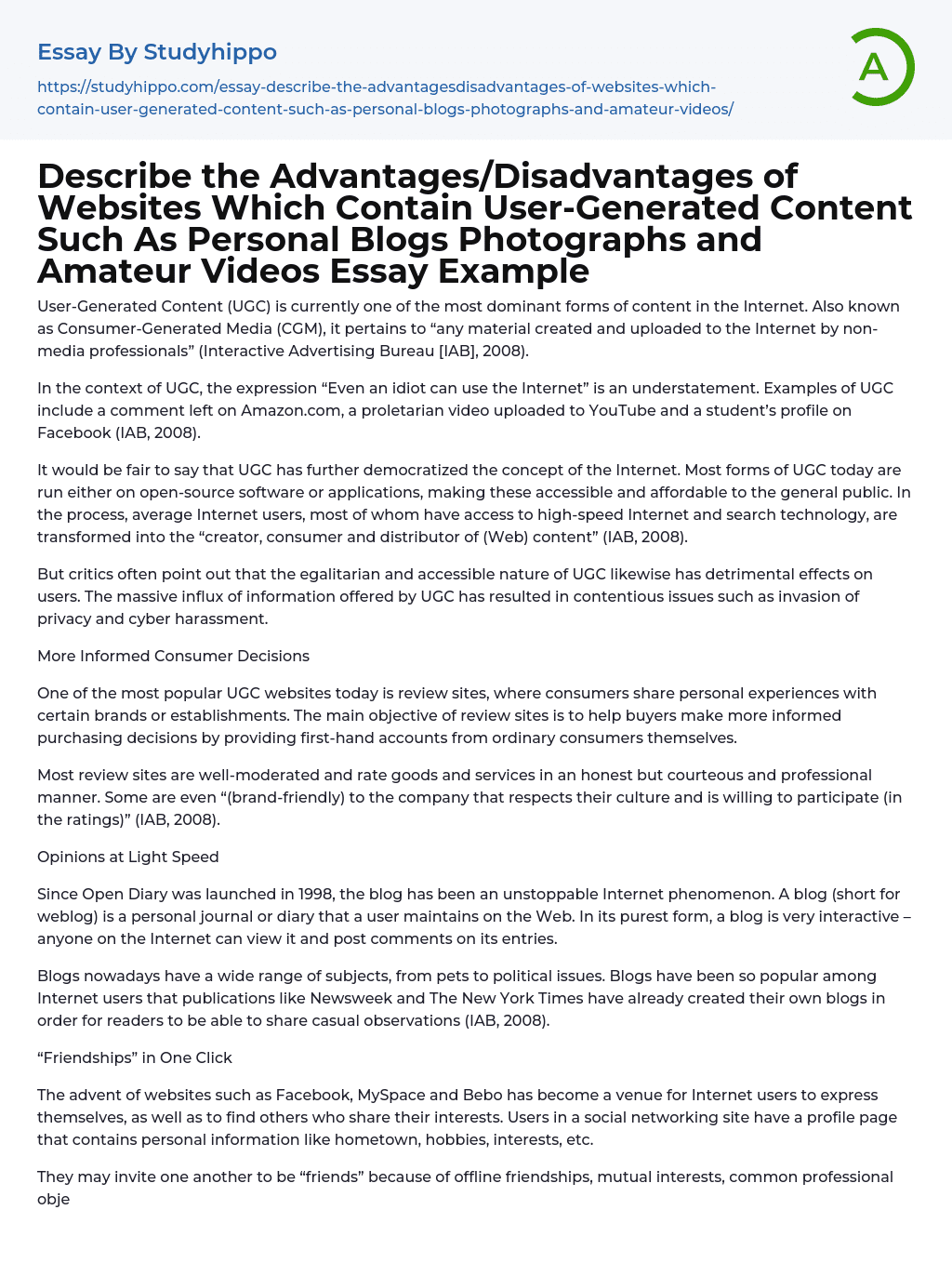User-Generated Content (UGC) or Consumer-Generated Media (CGM) is the dominant form of content on the Internet, encompassing material created and uploaded by non-media professionals, as defined by the Interactive Advertising Bureau (IAB) in 2008.
The following text shall beand unified while preserving the and their contents:
User-generated content (UGC), which includes comments on Amazon.com, videos on YouTube, and profiles on Facebook (IAB, 2008), is so accessible that it can be used by anyone, even individuals who may not be tech-savvy.
UGC has increased the democracy of the Internet by allowing regular users to generate, consume, and distribute web content. This is mainly because of open-source software or applications that make UGC available and affordable for all (IAB, 2008).
Despite the advantages of UGC's inclusive and accessible natur
...e, critics argue that it also has drawbacks for its users. The abundance of information provided by UGC has led to contentious problems like invasion of privacy and cyber harassment.
In order to make more informed consumer decisions
Review sites, which are currently popular UGC websites, allow consumers to share personal experiences with brands or establishments. These sites primarily exist to assist buyers in making informed purchasing decisions by offering firsthand accounts from regular consumers.
According to the IAB (2008), review sites usually offer impartial and professional evaluations for products and services. Additionally, they show support for companies that value their culture and actively participate in the rating process.
Opinions can be shared and spread quickly, almost as if they were traveling at the speed of light.
Open Diary, which has been an
Internet phenomenon since 1998, is a blog or personal journal that users maintain on the Web. In its most authentic version, a blog permits anyone to view and offer comments on its entries.
Online blogs have become popular and now cover a wide range of subjects, including pets and politics. Even major publications like Newsweek and The New York Times have their own blogs, which make it easy for readers to share informal observations (IAB, 2008).
"Friendships" can be made with just one click.
Social networking websites such as Facebook, MySpace, and Bebo provide internet users with a means to express themselves and connect with others who share similar interests. These platforms offer users the ability to create a profile page where they can share personal information like their hometown, hobbies, and interests.
IAB (2008) states that social networking sites facilitate connections between users based on various factors such as offline friendships, shared interests, career goals, or mutual acquaintances. These platforms also provide the ability to share comments, photos, videos, and web links.
The invasion of privacy is a concerning issue.
UGC, or user-generated content, is frequently criticized for inadvertently revealing personal lives to public scrutiny. Blogs and social networking platforms promote user expression, which can sometimes lead to offensive material being shared. It is not uncommon for internet users to openly disclose explicit information about their sexual encounters or upload suggestive images on their profiles.
Cyber Harassment
The rise of cyber harassment can be attributed to the abundance of UGC websites, where more and more people are becoming targets of offensive content that can be found
on blogs and websites.
There are instances where users receive death threats via email or mobile phones, even though victims of cyber harassment are often hesitant to report the incidents due to embarrassment and a misconception about the harassers' actions being considered "free speech."
In conclusion
UGC has made the Internet accessible to everyone, eliminating its exclusivity for content creators and media distributors.
In 2006, Time Magazine recognized Web users as the Person of the Year for their creation of user-generated content (UGC) on various platforms, made possible by the freedom granted to them by the internet.
Nevertheless, it is crucial to bear in mind that the freedom of User-Generated Content (UGC) necessitates utilizing it ethically. To prevent UGC websites from being utilized for infringing on the rights of others, rigorous regulations must be enforced. Rather than being employed for oppressive intentions, UGC should be leveraged to contribute positively to society.
References
The User-Generated platform status report by Interactive Advertising Bureau (IAB) was published in 2008.
- Email essays
- Hypertext Transfer Protocol essays
- Marshall Mcluhan essays
- Virtual Learning Environment essays
- Web Search essays
- Etiquette essays
- Mainstream essays
- Vodafone essays
- Web Search Engine essays
- Cloud Computing essays
- Computer Science essays
- Consumer Electronics essays
- Data Analysis essays
- Electronics essays
- engineering essays
- Enterprise Technology essays
- Hardware essays
- Impact of Technology essays
- Information Age essays
- Information Technology essays
- Modern Technology essays
- Operating Systems essays
- people search essays
- Robot essays
- Android essays
- Application Software essays
- Benchmark essays
- Computer Network essays
- Computer Programming essays
- Computer Security essays
- Computer Software essays
- Cryptography essays
- Data collection essays
- Data Mining essays
- Graphic Design essays
- Information Systems essays
- Internet essays
- Network Security essays
- Website essays
- World Wide Web essays
- John Locke essays
- 9/11 essays
- A Good Teacher essays
- A Healthy Diet essays
- A Modest Proposal essays
- A&P essays
- Academic Achievement essays
- Achievement essays
- Achieving goals essays
- Admission essays




